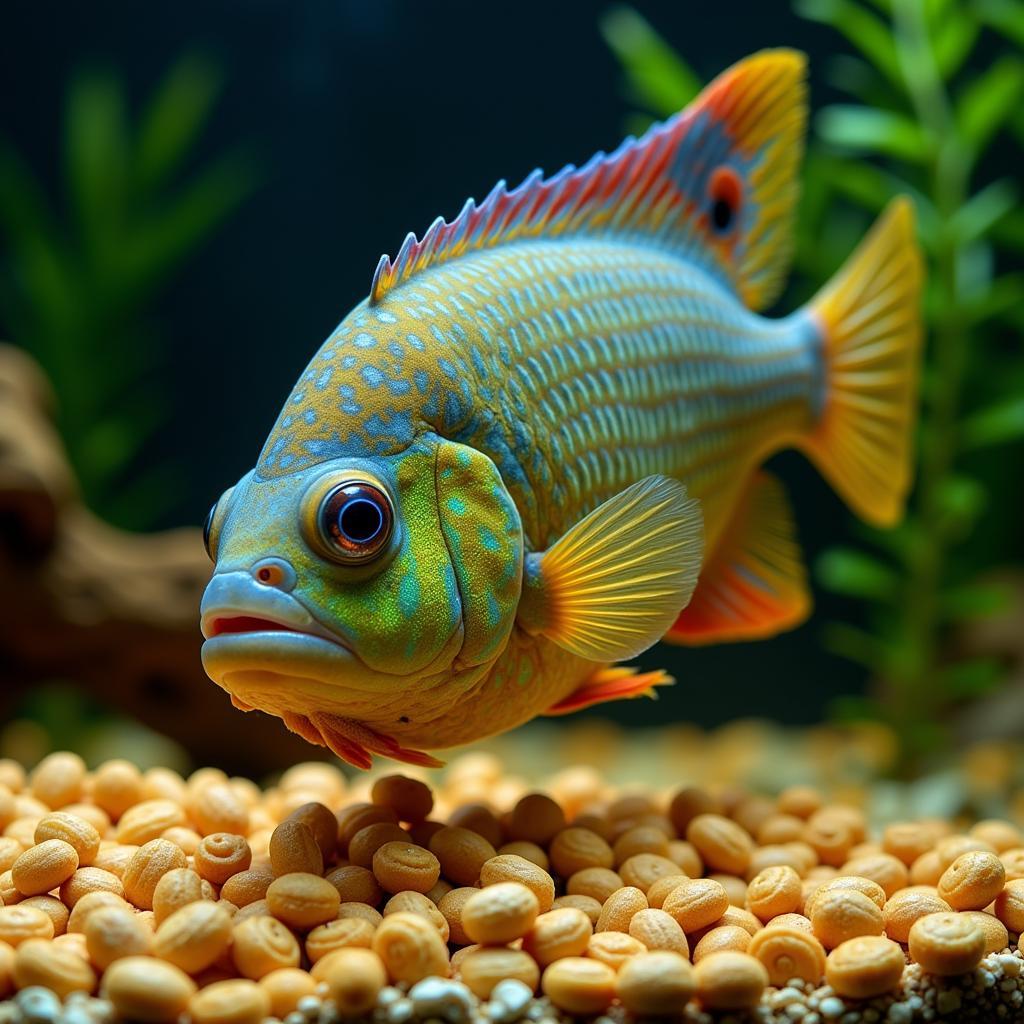The Complete Guide to African Cichlid Diet
African cichlids are a popular choice for freshwater aquariums thanks to their vibrant colors and fascinating behaviors. However, providing them with a proper diet is crucial for their health, color vibrancy, and overall well-being. This comprehensive guide will delve into the intricacies of an optimal African Cichlid Diet, ensuring your aquatic companions thrive in their tank environment.
 African Cichlid Feeding on Pellets
African Cichlid Feeding on Pellets
Understanding African Cichlids and their Dietary Needs
Before diving into specific food options, it’s essential to understand the dietary needs of African cichlids. These fish originate from diverse habitats across the African Great Lakes, resulting in varied dietary preferences based on their natural environments and evolutionary adaptations.
Categorizing African Cichlids by Diet
Generally, African cichlids can be categorized into three main dietary groups:
- Herbivores: These cichlids primarily graze on algae and plant matter. They possess specialized teeth and digestive systems for breaking down plant-based foods.
- Carnivores: These cichlids are predatory and thrive on a diet rich in protein. Their diet primarily consists of insects, crustaceans, and smaller fish in the wild.
- Omnivores: The largest group of African cichlids falls under the omnivore category. They require a balanced diet of both plant and animal matter.
Understanding your specific cichlid species and its dietary group is paramount for tailoring a suitable diet plan.
Essential Nutrients for African Cichlids
Irrespective of their specific dietary preferences, all African cichlids require a balanced combination of essential nutrients for optimal health:
- Protein: Essential for growth, muscle development, and overall health.
- Fat: Provides energy and aids in nutrient absorption.
- Carbohydrates: Offer a readily available energy source.
- Fiber: Crucial for digestion, particularly for herbivorous and omnivorous species.
- Vitamins and Minerals: Vital for various bodily functions, including immune system support, bone health, and color vibrancy.
Feeding Options for African Cichlids
Commercial Cichlid Food
Commercially prepared cichlid food is widely available and forms the basis of a balanced diet for most cichlid keepers. These foods come in various forms, including:
- Flakes: A popular choice, but ensure they are specifically formulated for African cichlids.
- Pellets: Often preferred over flakes as they sink more readily and offer better nutrient retention.
- Wafers: Ideal for bottom-feeding cichlids.
When choosing commercial food, consider your cichlid’s dietary group:
- Herbivore Formula: Rich in plant-based ingredients like spirulina and algae.
- Carnivore Formula: Higher protein content with ingredients like fish meal and krill.
- Omnivore Formula: Offers a balanced mix of plant and animal-based ingredients.
Live and Frozen Foods
Supplementing your cichlid’s diet with live or frozen foods provides enrichment and nutritional variety. Suitable options include:
- Brine Shrimp: A nutritious and readily accepted treat.
- Bloodworms: High in protein, ideal for carnivorous cichlids.
- Mysis Shrimp: Another excellent source of protein and essential fatty acids.
- Daphnia: Small crustaceans that provide a good source of fiber.
Vegetables and Plant Matter
For herbivorous and omnivorous cichlids, incorporate vegetables and plant matter into their diet. Blanch hard vegetables before feeding to make them more digestible. Suitable options include:
- Spinach: Rich in vitamins and minerals.
- Zucchini: A good source of fiber.
- Peas: High in protein and easily digestible.
- Spirulina: A nutrient-rich algae.
What to Avoid Feeding African Cichlids
Certain foods can be harmful to African cichlids and should be avoided:
- High-Fat Meats: Can lead to health problems like fatty liver disease.
- Overfeeding: Can result in poor water quality and health issues.
- Foods Not Specifically Designed for Cichlids: May lack essential nutrients.
Feeding Schedule and Quantity
- Frequency: Feed adult cichlids once or twice a day. Juveniles require more frequent feedings.
- Quantity: Offer only as much food as your cichlids can consume within 2-3 minutes.
Conclusion
A well-balanced African cichlid diet is essential for their long-term health, vibrant coloration, and active behavior. By understanding your cichlid’s specific needs and providing a varied diet of high-quality commercial food, live or frozen treats, and appropriate vegetables, you can ensure your aquatic companions thrive in their aquarium environment.
FAQs about African Cichlid Diet
1. Can I feed my African cichlids fruits?
While some cichlids might nibble on fruits, it’s best to stick to vegetables as a primary source of plant matter.
2. My cichlids are not eating their pellets. What should I do?
Try a different brand or variety of pellets. Soaking the pellets in tank water before feeding can also make them more appealing.
3. How often should I supplement with live or frozen food?
Offering live or frozen food 2-3 times a week is a good starting point. Adjust the frequency based on your cichlids’ response and overall health.
4. Can I feed my cichlids food meant for other fish species?
It’s best to stick to food specifically formulated for African cichlids to ensure they receive the correct nutrients.
5. How can I tell if I am overfeeding my cichlids?
Signs of overfeeding include cloudy water, excessive waste buildup, and lethargy in your fish.
6. Do I need to supplement my cichlids’ diet with vitamins?
If you are providing a varied and balanced diet, vitamin supplements are usually not necessary.
7. Can I breed my African cichlids?
Yes, many African cichlid species are relatively easy to breed in a home aquarium. However, breeding requires specific tank setups and careful consideration of the fry’s dietary needs.
For any further assistance or inquiries regarding African cichlid care, you can reach us at:
Phone Number: +255768904061
Email: kaka.mag@gmail.com
Address: Mbarali DC Mawindi, Kangaga, Tanzania.
Our dedicated customer support team is available 24/7 to assist you.

